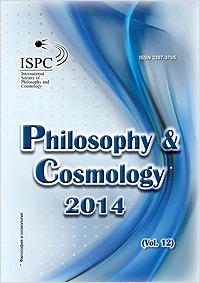Космологическая картина мира, вытекающая из гипотезы о фрактальной Вселенной
Сosmological Picture of the World Resulting from Hypothesis of Fractal Universe
Author(s): Sergei HaitunSubject(s): History, Geography, Regional studies, History of Philosophy, 19th Century Philosophy, Philosophy of Science, Ontology
Published by: Международное философско-космологическое общество
Keywords: fractal Universe; fractal dimension; topological dimension; our Metagalaxy; Big Bang; black hole; cosmic expansion; cosmic acceleration; principle of economy of thought;
Summary/Abstract: Cosmology studies the Universe as a whole, while only the interior of a sphere with radius of about 13.7 billion light years is available for our observation. Therefore, cosmology is overloaded by too strong (fantastic) hypotheses, which, however, are often considered by cosmologists as statements "strictly proven by science”. The purpose of the article is to simplify the cosmological picture of the world following the principle of economy of thought in order to discard fantastic assumptions. To do this, we employ only one hypothesis that can not be called fantastic: the Uni-verse is fractal. From this follows a chain of consequences: (1) the Universe is infinite; (2) its mass density is equal to zero; (3) only our Metagalaxy, having survived the Big Bang, is expanding, not the Universe; (4) our Metagalaxy is a black hole; (5) the process of Metagalaxy’s unfolding started some time ago; (6) the acceleration of cosmic expansion can be explained without the conception of dark energy with its quite fantastic properties; (7) if the Earth is not the center of our Metagalaxy, it is possible to observe spherical asymmetry of acceleration of the cosmic expansion.
Journal: Philosophy and Cosmology
- Issue Year: 2014
- Issue No: 13
- Page Range: 119-151
- Page Count: 33
- Language: Russian

